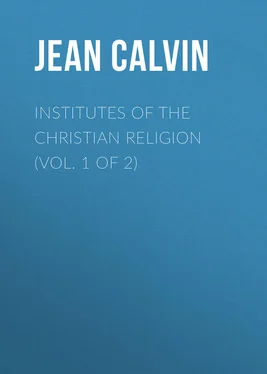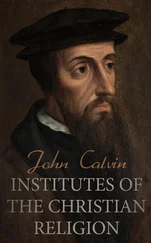Jean Calvin - Institutes of the Christian Religion (Vol. 1 of 2)
Здесь есть возможность читать онлайн «Jean Calvin - Institutes of the Christian Religion (Vol. 1 of 2)» — ознакомительный отрывок электронной книги совершенно бесплатно, а после прочтения отрывка купить полную версию. В некоторых случаях можно слушать аудио, скачать через торрент в формате fb2 и присутствует краткое содержание. Жанр: foreign_antique, foreign_prose, на английском языке. Описание произведения, (предисловие) а так же отзывы посетителей доступны на портале библиотеки ЛибКат.
- Название:Institutes of the Christian Religion (Vol. 1 of 2)
- Автор:
- Жанр:
- Год:неизвестен
- ISBN:нет данных
- Рейтинг книги:3 / 5. Голосов: 1
-
Избранное:Добавить в избранное
- Отзывы:
-
Ваша оценка:
- 60
- 1
- 2
- 3
- 4
- 5
Institutes of the Christian Religion (Vol. 1 of 2): краткое содержание, описание и аннотация
Предлагаем к чтению аннотацию, описание, краткое содержание или предисловие (зависит от того, что написал сам автор книги «Institutes of the Christian Religion (Vol. 1 of 2)»). Если вы не нашли необходимую информацию о книге — напишите в комментариях, мы постараемся отыскать её.
Institutes of the Christian Religion (Vol. 1 of 2) — читать онлайн ознакомительный отрывок
Ниже представлен текст книги, разбитый по страницам. Система сохранения места последней прочитанной страницы, позволяет с удобством читать онлайн бесплатно книгу «Institutes of the Christian Religion (Vol. 1 of 2)», без необходимости каждый раз заново искать на чём Вы остановились. Поставьте закладку, и сможете в любой момент перейти на страницу, на которой закончили чтение.
Интервал:
Закладка:
“Know, first, a spirit, with an active flame,
Fills, feeds, and animates this mighty frame;
Runs through the watery worlds, the fields of air,
The ponderous earth, the depths of heaven; and there
Glows in the sun and moon, and burns in every star.
Thus, mingling with the mass, the general soul
Lives in the parts, and agitates the whole.
From that celestial energy began
The low-browed brute, th' imperial race of man,
The painted birds who wing th' aërial plain,
And all the mighty monsters of the main;
Their souls at first from high Olympus came,” &c. 87 87 Æneid vi. Pitt's Translation.
Just as if the world, which is a theatre erected for displaying the glory of God, were its own creator! For thus writes the same poet in another place, following the common opinion of the Greeks and Latins —
“Led by such wonders, sages have opined,
That bees have portions of a heavenly mind;
That God pervades, and, like one common soul,
Fills, feeds, and animates the world's great whole;
That flocks, herds, beasts, and men, from him receive
Their vital breath; in him all move and live;
That souls discerpt from him shall never die,
But back resolved to God and heaven shall fly,
And live for ever in the starry sky.” 88 88 Georg. iv. Warton's Translation.
See the efficacy of that jejune speculation concerning a universal mind animating and actuating the world, in the production and encouragement of piety in the human heart. This more fully appears also from the profane expressions of the filthy Lucretius, which are deductions from the same principle. 89 89 De Rerum Natur. lib. 1.
Its true tendency is to set up a shadowy deity, and to banish all ideas of the true God, the proper object of fear and worship. I confess, indeed, that the expression, that nature is God, may be used in a pious sense by a pious mind; but, as it is harsh and inconsistent with strict propriety of speech, nature being rather an order prescribed by God, it is dangerous in matters so momentous, and demanding peculiar caution, to confound the Deity with the inferior course of his works.
VI. Let us remember, then, in every consideration of our own nature, that there is one God, who governs all natures, and who expects us to regard him, to direct our faith to him, to worship and invoke him. For nothing is more preposterous than to enjoy such splendid advantages, which proclaim within us their divine origin, and to neglect the Author who bountifully bestows them. Now, what illustrious specimens of his power have we to arrest our attention! unless it be possible for us not to know what strength is required to sustain with his word this immense fabric of heaven and earth; now by his mere nod to shake the heaven with roaring peals of thunder, to consume whatever he choose with lightnings, and set the atmosphere on fire with the flame; now to disturb it with tempests in various forms, and immediately, if he please, to compose all to instantaneous serenity; to restrain, suspended as it were in air, the sea, which, by its elevation, seems to threaten the earth with continual devastation; now raising it in a tremendous manner, by the tumultuous violence of the winds, and now appeasing the waves to render it calm. To this purpose are the numerous praises of the power of God, drawn from the testimonies of nature, particularly in the book of Job, and in the prophecies of Isaiah; which I now purposely omit, as they will be more suitably introduced, when I discuss the scriptural account of the creation of the world. Only I wished at present to hint, that this way of seeking God, by tracing the lineaments which, both above and below us, exhibit such a lively adumbration of him, is common to aliens, and to those who belong to his family. His power leads us to the consideration of his eternity; because he, from whom all things derive their origin, must necessarily be eternal and self-existent. But if we inquire the reason that induced him first to create all things, and now to preserve them, we shall find the sole cause to be his own goodness. But though this be the only cause, it should be more than sufficient to attract us to love him; since, according to the Psalmist, 90 90 Psalm cxlv. 9.
there is no creature that does not participate in the effusions of his mercy.
VII. In the second species of his works, such as happen out of the ordinary course of nature, the proofs of his perfections are equally clear. For he so regulates his providence in the government of human society, that, while he exhibits, in innumerable ways, his benignity and beneficence to all, he likewise declares, by evident and daily indications, his clemency to the pious, and his severity to the wicked and ungodly. For no doubt can be entertained respecting his punishment of flagitious crimes; inasmuch as he clearly demonstrates himself to be the guardian and avenger of innocence, in prospering with his blessing the life of good men, in assisting their necessities, assuaging and comforting their sorrows, alleviating their calamities, and providing in all things for their safety. Nor should it perplex or eclipse his perpetual rule of righteousness, that he frequently permits the wicked and guilty for a time to exult in impunity; but suffers good men to be undeservedly harassed with much adversity, and even to be oppressed by the iniquitous malice of the ungodly. We ought rather to make a very different reflection; that, when he clearly manifests his wrath in the punishment of one sin, he hates all sins; and that, since he now passes by many sins unpunished, there will be a judgment hereafter, till which the punishment is deferred. So, also, what ample occasion he supplies us for the consideration of his mercy, while, with unwearied benignity, he pursues the miserable, calling them back to himself with more than paternal indulgence, till his beneficence overcomes their depravity!
VIII. To this end the Psalmist, 91 91 Psalm cvii.
mentioning that God, in desperate cases, suddenly and wonderfully succors, beyond all expectation, those who are miserable and ready to perish, either protecting from beasts of prey such as are wandering in deserts, and, at length, reconducting them into the right way, or supplying with food the needy and hungry, or delivering captives from dreary dungeons and iron chains, or bringing the shipwrecked safe into port, or healing the diseases of some who are almost dead, or scorching the earth with excessive heat and drought, or fertilizing it with the secret showers of his mercy, or elevating the meanest of the vulgar, or degrading nobles from their dignified stations, – the Psalmist, I say, having proposed such examples as these, infers from them that what are accounted fortuitous accidents, are so many proofs of his heavenly providence, especially of his paternal clemency; and that hence the pious have cause to rejoice, while the mouths of the impious and reprobate are stopped. But, since the majority of men, immersed in their errors, are blind amidst the greatest opportunities of seeing, he accounts it a rare instance of singular wisdom discreetly to consider these works of God; 92 92 Psalm cvii. 43.
from the sight of which, some, who, in other instances, discover the greatest acuteness, receive no benefit. And, notwithstanding all the displays of the glory of God, scarcely one man in a hundred, is really a spectator of it. His power and wisdom are equally conspicuous. His power is illustriously manifested, when the ferocity of the impious, universally deemed insuperable, is quelled in an instant, their arrogance subdued, their strongest fortresses demolished, their weapons and armour broken in pieces, their strength diminished, their machinations confounded, and they fall by their own exertions; when the audacity, which exalted itself above the heavens, is thrown down to the centre of the earth; when, on the contrary, “the poor are raised out of the dust, and the needy out of the dunghill;” 93 93 Psalm cxiii. 7.
the oppressed and afflicted extricated from distressing extremities, and the desperate restored to a good hope; when the unarmed are victorious over those who are armed, the few over the many, the weak over the strong. But his wisdom is eminently displayed in ordering every dispensation at the best possible time, confounding the greatest worldly sagacity, “taking the wise in their own craftiness,” 94 94 1 Cor. iii. 19.
and finally disposing all things according to the dictates of the highest reason.
Интервал:
Закладка:
Похожие книги на «Institutes of the Christian Religion (Vol. 1 of 2)»
Представляем Вашему вниманию похожие книги на «Institutes of the Christian Religion (Vol. 1 of 2)» списком для выбора. Мы отобрали схожую по названию и смыслу литературу в надежде предоставить читателям больше вариантов отыскать новые, интересные, ещё непрочитанные произведения.
Обсуждение, отзывы о книге «Institutes of the Christian Religion (Vol. 1 of 2)» и просто собственные мнения читателей. Оставьте ваши комментарии, напишите, что Вы думаете о произведении, его смысле или главных героях. Укажите что конкретно понравилось, а что нет, и почему Вы так считаете.












